What is ProcessorProgression
ProcessorProgression is an adware application that targets Mac platform. Adware is type of malicious software that can cause issues for Mac computers. ProcessorProgression can generate numerous additional popup, banner, pop-under and in-text link advertisements flooding on your internet browser; collect your privacy data like login details, online searches, etc; run in the background and drag down your machine running speed; give more chances for other adware, potentially unwanted apps even malware to get on your MAC.

Unwanted ads
Even worse, the adware can monetize its functionality by collecting privacy information from your browsing sessions. This confidential information, afterwards, can be easily used for marketing purposes. This puts your personal information at a security risk.
Below we are discussing the methods which are very effective in uninstalling adware. The tutorial will also assist you to remove ProcessorProgression from your MAC for free.
How does ProcessorProgression get on your MAC
Adware software mostly comes on the computer with freeware. Most often, it comes without the user’s knowledge. Therefore, many users aren’t even aware that their MAC has been affected with PUAs and adware. Please follow the easy rules in order to protect your MAC from adware and potentially unwanted apps: do not install any suspicious software, read the user agreement and select only the Custom, Manual or Advanced install type, do not rush to click the Next button. Also, always try to find a review of the installed app on the Internet. Be careful and attentive!
Threat Summary
| Name | ProcessorProgression |
| Type | adware software, PUP (potentially unwanted program), Mac malware, Mac virus |
| Detection Names | Osx.Adware.Cimpli, ApplicUnwnt, Trojan-Downloader.OSX.Adload, Adware.MAC.Generic, OSX.Trojan.Gen, Program:MacOS/Vigram.A, Adware/Adload!OSX and MacOS.Agent-MT |
| Distribution | Freeware installers, misleading pop up ads, torrent downloads and fake updaters |
| Symptoms | You keep getting redirected to suspicious webpages, adverts appear in places they shouldn’t be, unwanted program installed without your knowledge, new toolbars suddenly added on your browser, your web browser search provider has modified without your permission, slow Internet or slow browsing. |
| Removal | ProcessorProgression removal guide |
How to Remove ProcessorProgression (Adware removal steps)
Fortunately, we’ve an effective method that will assist you manually or/and automatically delete ProcessorProgression from your Mac computer and bring your web browser settings, including new tab, search provider by default and start page, back to normal. Below you will find a removal steps with all the steps you may need to successfully get rid of adware software and its traces. Read this manual carefully, bookmark it or open this page on your smartphone, because you may need to exit your web browser or reboot your computer.
To remove ProcessorProgression, perform the steps below:
- Remove profiles created by ProcessorProgression
- Uninstall ProcessorProgression associated software by using the Finder
- Remove ProcessorProgression related files and folders
- Scan your Mac with MalwareBytes
- Remove ProcessorProgression from Safari, Chrome, Firefox
- How to stay safe online
Remove profiles created by ProcessorProgression
ProcessorProgression can make changes to the Mac system such as malicious changes to browser settings, and the addition of malicious system profiles. You need to check the system preferences, find and remove malicious profiles and ensure your settings are as you expect.
Click the System Preferences icon ( ![]() ) in the Dock, or choose Apple menu (
) in the Dock, or choose Apple menu ( ![]() ) > System Preferences.
) > System Preferences.
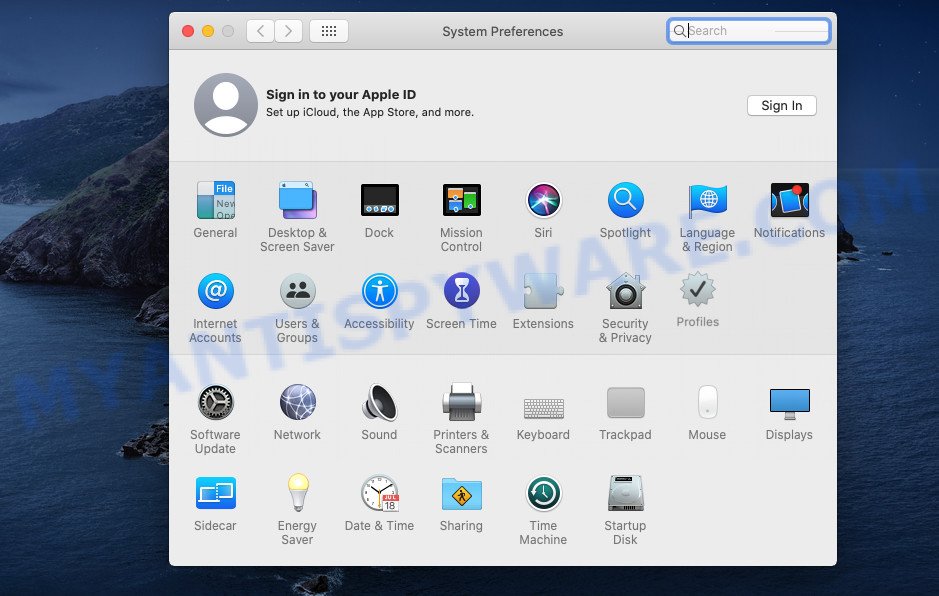
In System Preferences, click Profiles, then select a profile associated with ProcessorProgression.
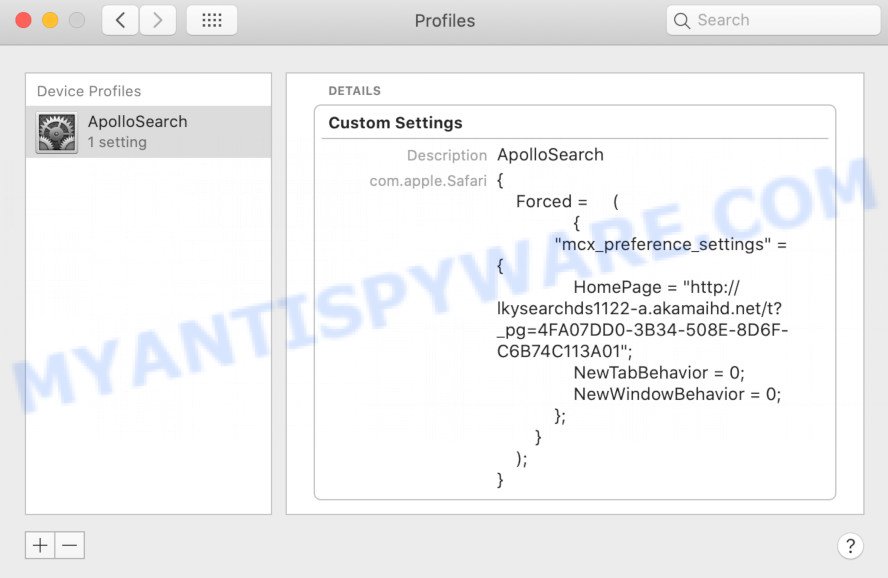
Click the minus button ( – ) located at the bottom-left of the Profiles screen to remove the profile.
Note: if you do not see Profiles in the System Preferences, that means there are no profiles installed on your Mac computer, which is normal.
Uninstall ProcessorProgression associated software by using the Finder
It is of primary importance to identify and remove browser hijackers, adware and potentially unwanted programs through ‘Applications’ section of your Finder.
Make sure you have closed all web browsers and other software. Next, uninstall any undesired and suspicious applications from MAC OS using the Finder.
Open Finder and click “Applications”.
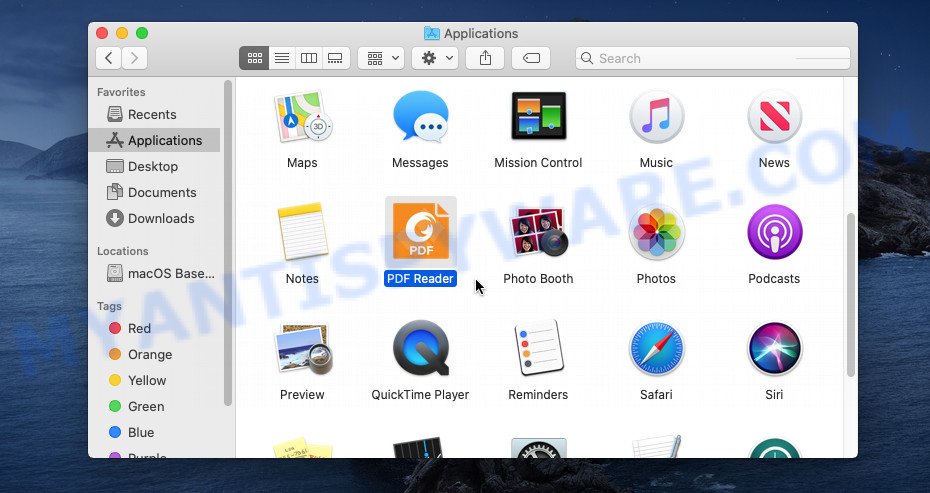
Look around the entire list of software installed on your computer. Most likely, one of them is the ProcessorProgression adware software. Choose the questionable program or the program that name is not familiar to you and uninstall it.
Drag the suspicious application from the Applications folder to the Trash.
Most important, don’t forget, select Finder -> Empty Trash.
Remove ProcessorProgression related files and folders
Now you need to try to find ProcessorProgression related files and folders, and then delete them manually. You need to look for these files in certain directories. To quickly open them, we recommend using the “Go to Folder…” command.
ProcessorProgression creates several files, these files must be found and removed. Below is a list of files associated with this unwanted application.
- /Library/LaunchDaemons/com.ProcessorProgression.system.plist
- ~/Library/LaunchAgents/com.ProcessorProgression.service.plist
- /Library/Application Support/.(RANDOM)/System/com.ProcessorProgression.system
- ~/Library/Application Support/.(RANDOM)/Services/com.ProcessorProgression.service.app
Some files created by ProcessorProgression are hidden from the user. To find and delete them, you need to enable “show hidden files”. To do this, use the shortcut CMD + SHIFT + . Press once to show hidden files and again to hide them. There is another way. Click Finder -> Applications -> Utilities -> Terminal. In Terminal, paste the following text: defaults write com.apple.finder AppleShowAllFiles YES

Press Enter. Hold the ‘Option/alt’ key, then right click on the Finder icon in the dock and click Relaunch.
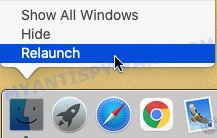
Click on the Finder icon. From the menu bar, select Go and click “Go to Folder…”. As a result, a small window opens that allows you to quickly open a specific directory.

Check for ProcessorProgression generated files in the /Library/LaunchAgents folder

In the “Go to Folder…” window, type the following text and press Go:
/Library/LaunchAgents
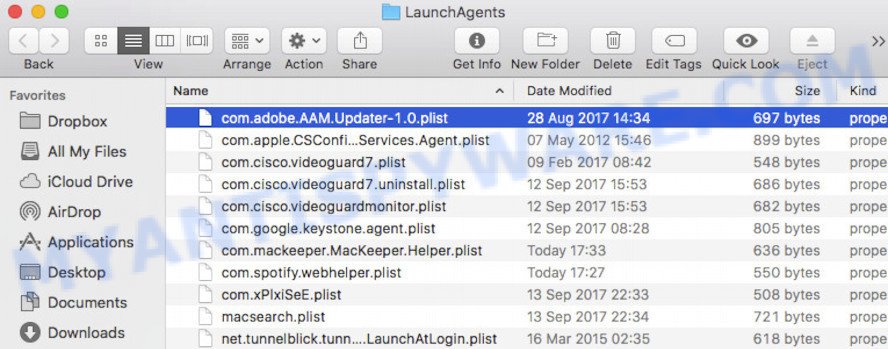
This will open the contents of the “/Library/LaunchAgents” folder. Look carefully at it and pay special attention to recently created files, as well as files that have a suspicious name. Move all suspicious files to the Trash. A few examples of files: search.plist, com.net-preferences.plist, macsearch.plist, com.google.defaultsearch.plist, , com.ProcessorProgression.service.plist, com.machelper.plist and installapp.plist. Most often, browser hijackers, adware and PUPs create several files with similar names.
Check for ProcessorProgression generated files in the /Library/Application Support folder

In the “Go to Folder…” window, type the following text and press Go:
/Library/Application Support
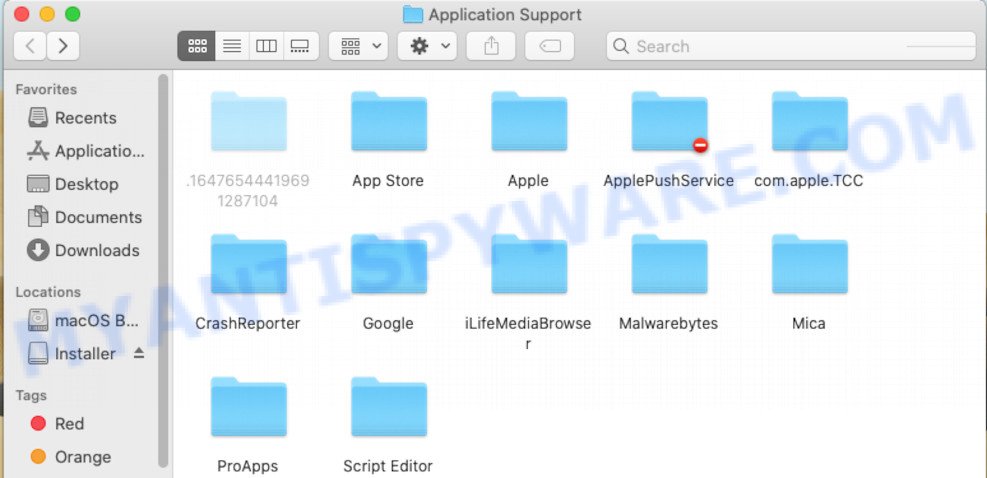
This will open the contents of the “Application Support” folder. Look carefully at its contents, pay special attention to recently added/changed folders and files. Check the contents of suspicious folders, if there is a file with a name similar to com.ProcessorProgression.system, then this folder must be deleted. Move all suspicious folders and files to the Trash.
Check for ProcessorProgression generated files in the “~/Library/LaunchAgents” folder

In the “Go to Folder…” window, type the following text and press Go:
~/Library/LaunchAgents

Proceed in the same way as with the “/Library/LaunchAgents” and “/Library/Application Support” folders. Look for suspicious and recently added files. Move all suspicious files to the Trash.
Check for ProcessorProgression generated files in the /Library/LaunchDaemons folder
In the “Go to Folder…” window, type the following text and press Go:
/Library/LaunchDaemons

Carefully browse the entire list of files and pay special attention to recently created files, as well as files that have a suspicious name. Move all suspicious files to the Trash. A few examples of files to be deleted: com.ProcessorProgression.system.plist, com.search.system.plist, com.installapp.system.plist, com.machelper.system.plist and com.macsearch.system.plist. In most cases, browser hijackers, adware and PUPs create several files with similar names.
Scan your Mac with MalwareBytes
Manual ProcessorProgression removal requires some computer skills. Some files and system entries that created by the adware can be not fully removed. We suggest that use MalwareBytes to scan the Apple computer. Moreover, this program will allow you to remove adware, potentially unwanted programs, browser hijackers and toolbars that your computer may be affected too.
MalwareBytes Anti-Malware can be downloaded from the following link.
21020 downloads
Author: Malwarebytes
Category: Security tools
Update: September 10, 2020
Once the downloading process is finished, close all windows on your Apple Mac. Further, run the saved file. Follow the prompts.
The MalwareBytes AntiMalware will automatically run and you may see its main window like below.
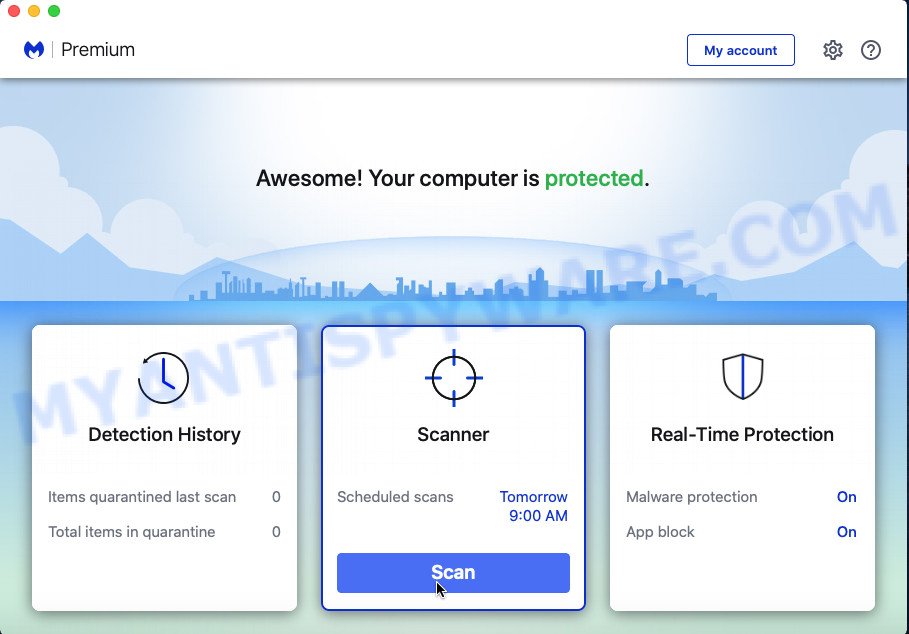
Next, press the “Scan Now” button to perform a system scan with this utility for the ProcessorProgression . A system scan can take anywhere from 5 to 30 minutes, depending on your MAC OS. During the scan MalwareBytes Anti-Malware will search for threats exist on your Apple Mac.
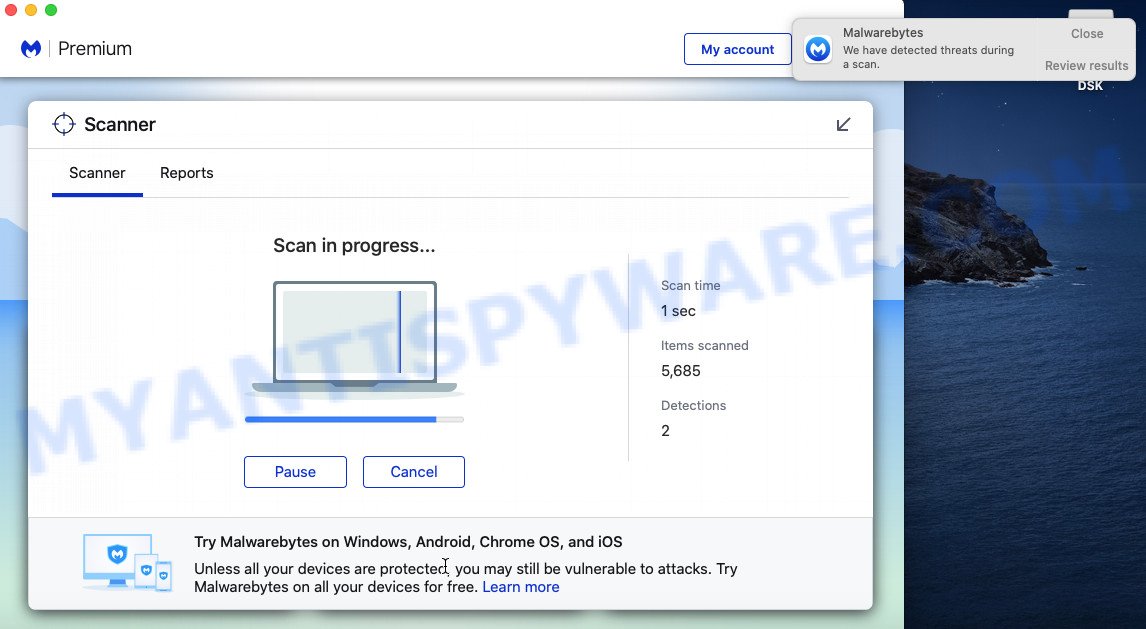
When the scanning is complete, MalwareBytes Anti-Malware will open a screen that contains a list of malicious software that has been detected. Review the scan results and then press the “Quarantine” button.
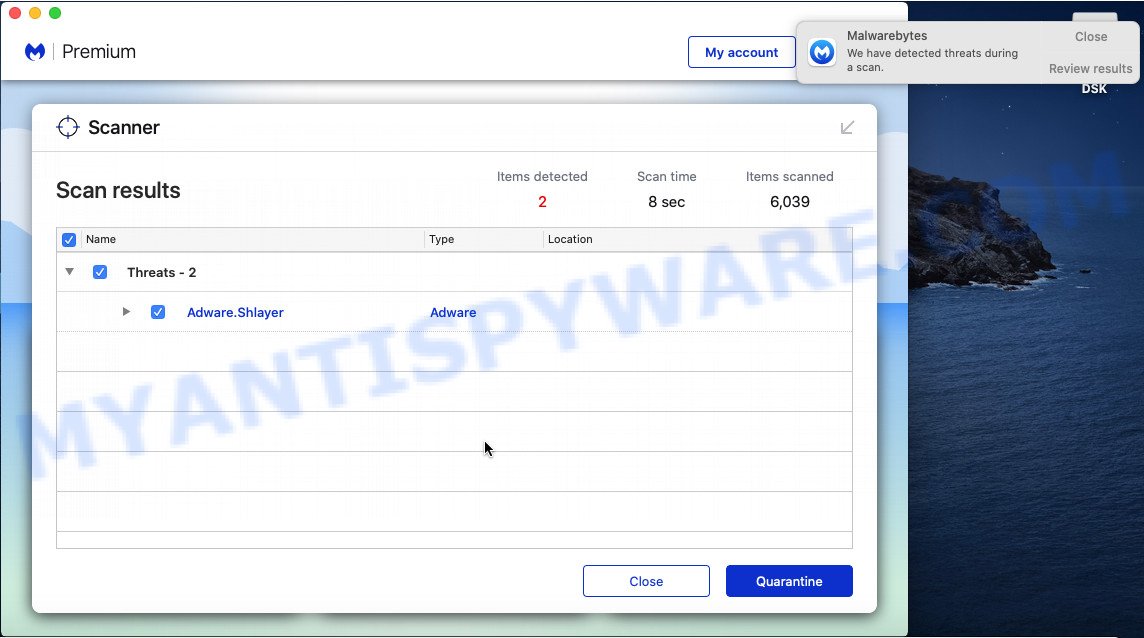
The MalwareBytes will start to get rid of ProcessorProgression adware.
Remove ProcessorProgression from Safari, Chrome, Firefox
If you have ‘ProcessorProgression adware software’ removal problem, then remove unwanted add-ons can help you. In the steps below we’ll show you the way to remove malicious extensions without reinstall. This will also help to get rid of ProcessorProgression adware from your internet browser.
You can also try to delete ProcessorProgression by reset Chrome settings. |
If you are still experiencing issues with ProcessorProgression removal, you need to reset Firefox browser. |
|
How to stay safe online
It’s important to run ad blocking apps such as AdGuard to protect your Apple Mac from harmful web-pages. Most security experts says that it’s okay to block advertisements. You should do so just to stay safe! And, of course, the AdGuard can to block misleading and other unwanted webpages.
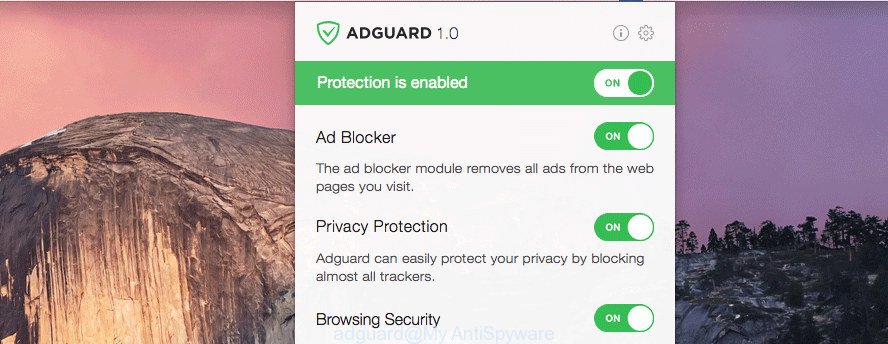
- Visit the page linked below to download AdGuard.
AdGuard for Mac download
3780 downloads
Author: © Adguard
Category: Security tools
Update: January 17, 2018
- Once the downloading process is done, start the downloaded file. You will see the “Setup Wizard” program window. Follow the prompts.
- Once the setup is complete, click “Skip” to close the installation program and use the default settings, or click “Get Started” to see an quick tutorial that will help you get to know AdGuard better.
- In most cases, the default settings are enough and you do not need to change anything. Each time, when you start your MAC, AdGuard will start automatically and stop intrusive ads, block malicious and misleading web-pages.
Finish words
We suggest that you keep AdGuard (to help you stop unwanted pop-up advertisements and annoying harmful web-sites) and MalwareBytes (to periodically scan your machine for new malicious software, browser hijackers and adware). Make sure that you have all the Critical Updates recommended for Mac operating system. Without regular updates you WILL NOT be protected when new hijackers, malicious programs and adware software are released.
If you are still having problems while trying to delete ProcessorProgression from your browser, then ask for help here.



















